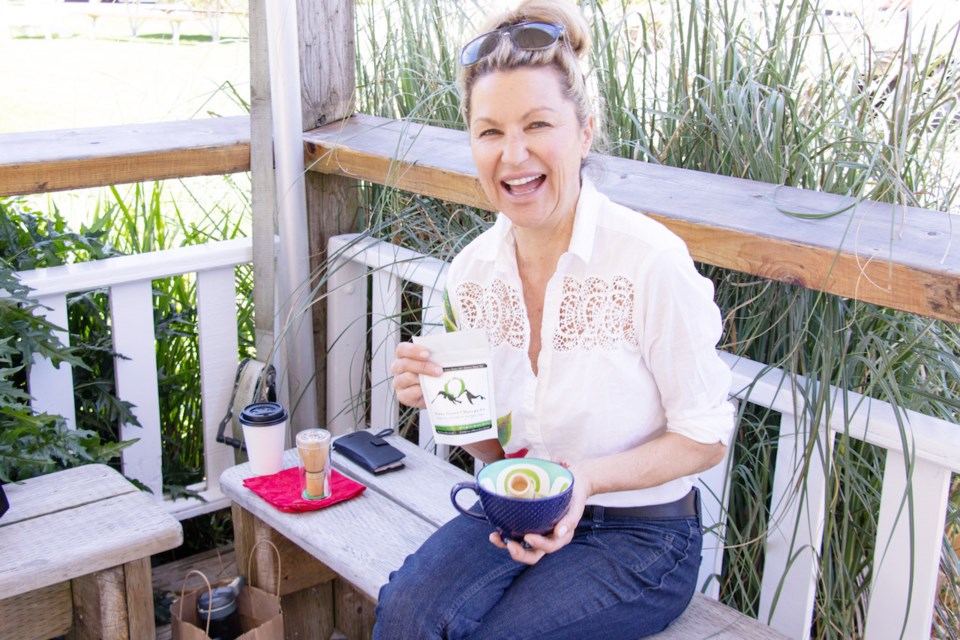It’s been 17 years since the bright green hue of the crushed leaves from the very top of tea plants in Japan first caught Naomi Thomas's eye.
A friend had taken Thomas to a tea house in Vancouver and bought her a little cup of matcha. “And it tasted disgusting,” the islander recalled.
It took some time for the bitter, strong taste to grow on Thomas (she served it to me with stevia sweetening, for an altogether pleasant taste) but the spark that day grew into Lady Matcha. The entrepreneur started down a path that led her through glamour and loss, and eventually, to the Bowen Island Matcha Company.
Before the sensation
Tea – black, green, oolong, white, yellow, pu-erh – comes from the same plant, Camellia sinensis. Matcha is grown in shade, so that the leaves produce more chlorophyll trying to get sunlight, and only the very top leaves are harvested for matcha. The leaves are meticulously de-veined and crushed in large granite grinders. It takes an hour to grind a 40 gram tin, said Thomas.
The crushed leaves are mixed with water or milk (or whatever else – Thomas has matcha ice cream) and drunk, instead of getting steeped and set aside.
In 2004, matcha was little known in North America but it’s since grown into a sensation, with chains like Starbucks selling versions of the centuries old tea.
Back then, Thomas had been in health sciences, pharmaceuticals, had consulted with start-ups, at one point ran an anti-aging clinic, but was looking for something to sell that she believed in. “I wanted to sell things to really make people healthy, not just claim to make people healthy,” she said.
The tradition of the tea in Buddhist meditation appealed to Thomas – she’d done meditation most of her life. “When I read about that, I got more interested in a tea just from a philosophical point of view,” she said.
“Then I dove into the chemistry of it,” said Thomas. Where coffee is known for its instant ‘kick’ of energy, matcha delivers the caffeine in a different way for more of a slow burn energy boost. “I just started to think, okay, if we can get caffeinated without the jitters, and without the blood sugar drops, and also get this feeling of alpha waves [matcha contains L-theanine, an amino acid that increases the stress-reducing alpha waves in the brain] and this feeling of calmness…” she said. “So, I started to sell it.”
Thomas flew to San Francisco to meet the CEO of Whole Foods and served him matcha. The grocery chain became her first client and she formed Zen Matcha – which the website today describes as “the first North American company entirely dedicated to authentic Japanese Matcha tea.”
“Nobody had it – Starbucks didn’t have it,” said Thomas. She hired sales people and distributors and supplied all of the Whole Food stores on Canada’s West Coast. There were displays and demos, radio shows and TV shows. “It was so much fun,” she recalled. “I was on a plane every week.”
Returning home
But when her sister and parents got sick, Thomas had to return to Vancouver to care for her family. She pulled out of Whole Foods and retail in general and transitioned to an online store. “I was exhausted, I couldn’t take care of my family, I couldn’t do it all,” she said.
She ended up selling the trademark and putting business on hold while she was a caregiver for six years. “That was a very interesting time in my life. It was very difficult and really rewarding.”
The caregiving ended a couple of years ago and Thomas needed a fresh start. “I needed to grieve because it was a big deal for me, losing my family.”
She sold her parents’ house in Deep Cove and moved to Bowen two years ago. “And I sure came to a good place.”
Finding balance
Thomas didn’t even think of selling matcha until about four months ago when she got a call from the Ruddy Potato, “We understand you had a matcha business – can you give us some?” Thomas recounted them asking.
But where 20 years ago Thomas had little competition, today, matcha companies abound. The islander wasn’t willing to compromise on the quality of the tea – to buy the cheaper mass-produced, differently processed iterations – and the Ruddy agreed. “They said no, your price point’s good. Call your people in Kyoto,” said Thomas. “So I got on the phone to the Takagawas, who I’ve been working with for 20 years, and they’re traditional Japanese.”
“And they were so excited,” said Thomas.
She started doing demonstrations at the Ruddy and was overwhelmed by the response. “So many people here don’t really know what [matcha] is and I think that Bowen’s kind of a coffee drinking island,” said Thomas. “But I’ve already had so many people, just emailing calling saying oh my god, this has changed my life.”
So, she started the Bowen Island Matcha Company, now selling matcha to and at the Ruddy Potato, Snug Café, Artisan Eats and Alderwood Farm. But this time, Thomas isn’t aiming for a jet-setting life – she’s looking for balance. “I just want to share with people,” she said. “I’m not in this for the money. It’s really not that kind of business for me. It’s more the satisfaction of just seeing people’s faces light up, for one thing, when they taste it.” (Again, a couple of drops of sweetener is key for newbies.)



